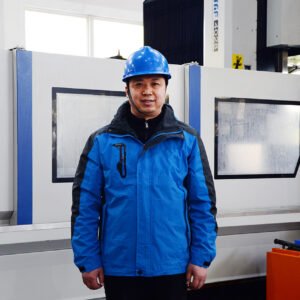In the harsh environments where industrial equipment operates, material selection often determines your equipment's lifespan and maintenance costs. Vesconite, a revolutionary engineering plastic, has proven its exceptional value in the world's most demanding working conditions. Whether facing the dust and abrasion of mining operations, the corrosive challenges of marine environments, the high-load vibrations of railway systems, or the harsh weather and chemical exposure in agriculture, traditional materials like bronze and nylon often fail quickly, while Vesconite continues to perform reliably. This article explores how this self-lubricating, high-load bearing, zero-expansion advanced engineering plastic creates substantial operational benefits and competitive advantages across various industry applications.
Applications of Vesconite
Vesconite isn’t just a fascinating material on paper; it’s hard at work in the real world, keeping industries running smoother, longer, and more efficiently. What truly sets Vesconite apart is its versatility. Whether buried underground in a mine, submerged deep beneath ocean waters, or speeding across rail networks, Vesconite has proven its value time and time again.
Let’s dive deeper into the industries and applications where Vesconite really shines.
Industrial Applications
Industries like mining, construction, and heavy machinery represent some of the most brutal environments you can imagine. Equipment in these sectors is exposed to:
- Gritty dust and abrasive particles
- High temperatures from constant friction
- Water and mud, leading to corrosion
- Heavy mechanical loads that stress parts to the limit
Traditional materials like bronze or nylon often buckle under these conditions, with bronze corroding and wearing out, nylon swelling and losing dimensional stability.
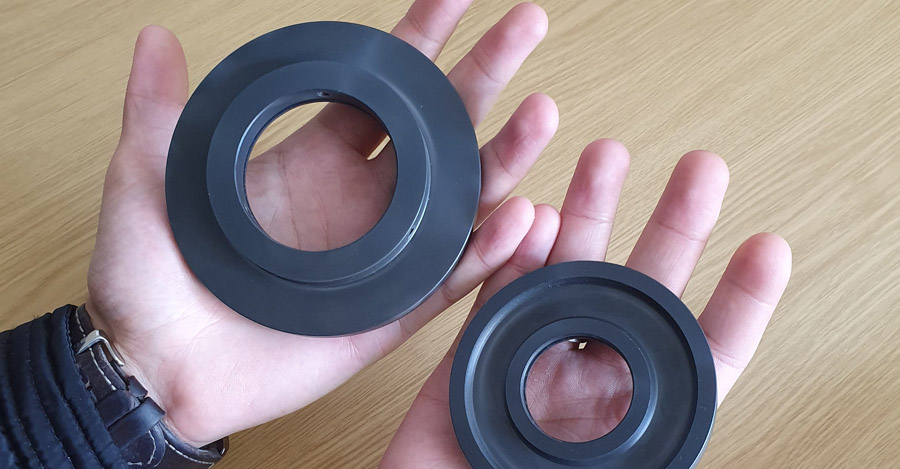
Industrial Applications of Vesconite
Vesconite steps in with a triple threat:
- High load-bearing capacity
- Self-lubricating properties
- Resistance to wear and corrosion
Key industrial applications include:
- Bearings and bushings for rock crushers, drilling equipment, and conveyor rollers, eliminating the need for constant lubrication and minimizing downtime.
- Wear plates in bulldozers, excavators, and loaders, areas that see constant sliding and impact forces.
- Roller wheels and guide strips on production and assembly lines, ensuring smooth, uninterrupted operation even in dusty environments.
Industrial users don’t just like Vesconite; they depend on it. In sectors where downtime can cost thousands of dollars an hour, the longevity and reliability that Vesconite delivers become a serious competitive advantage. Fewer breakdowns mean fewer service calls, reduced part replacements, and ultimately lower operating costs.
Marine Applications
If there’s one environment that tests the limits of materials, it’s the marine world. Water, and especially seawater, is relentless:
- Metals corrode.
- Conventional plastics absorb moisture and swell.
- Bearings and bushings degrade faster under constant load and movement.
This is exactly where Vesconite’s dimensional stability and corrosion resistance come into play.
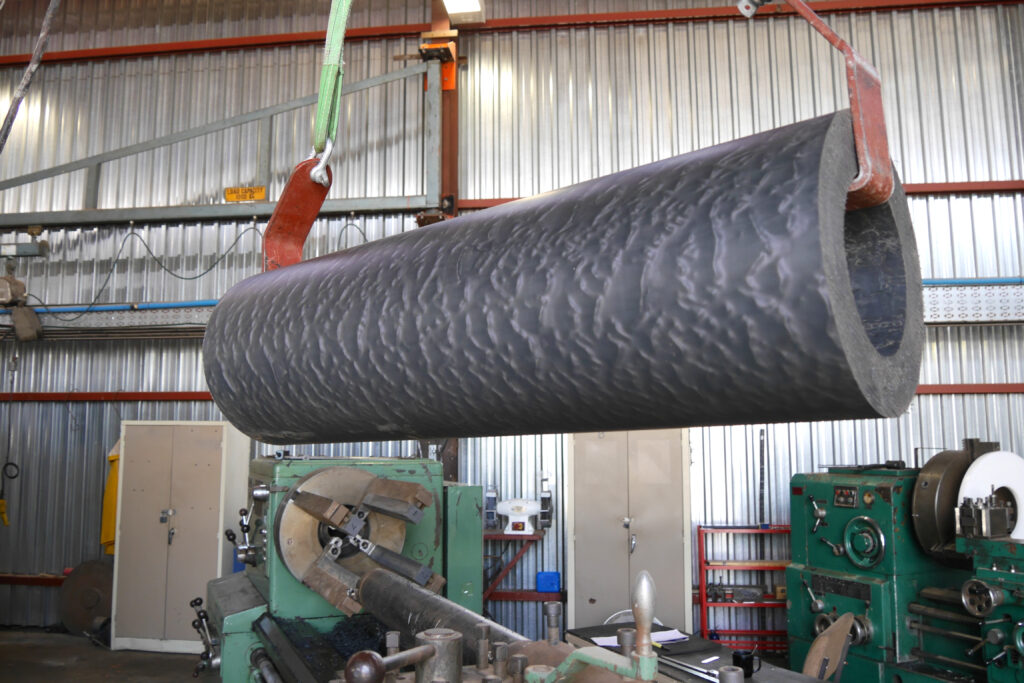
Marine Applications of Vesconite
Key marine applications include:
- Rudder bearings and stern tube bearings, where tight tolerances and smooth movement are critical for safe navigation.
- Propeller shaft bearings are constantly submerged and under rotating stress.
- Steering gear bushings are areas that must resist not only water but also high mechanical loads and impacts.
Unlike nylon or bronze, Vesconite:
- Doesn’t swell, maintaining its shape and tolerances even after years underwater.
- Doesn’t corrode, no pitting, rusting, or material breakdown, even in saltwater environments.
Another major benefit? Vesconite’s low friction reduces wear on mating components and helps lower fuel consumption by improving mechanical efficiency, an increasingly important factor as the marine industry looks for ways to reduce operational costs and carbon emissions.
For shipbuilders and marine engineers, Vesconite often translates into longer service intervals, less maintenance, and greater operational safety, a win on all fronts.
Railways
The railway industry faces a unique set of challenges:
- High speeds cause significant friction and wear.
- Heavy loads put enormous stress on every mechanical component.
- Vibration and impact forces constantly test the endurance of parts.
- Remote locations make frequent maintenance difficult and costly.
For all these reasons, Vesconite has become a trusted material for critical railway components.
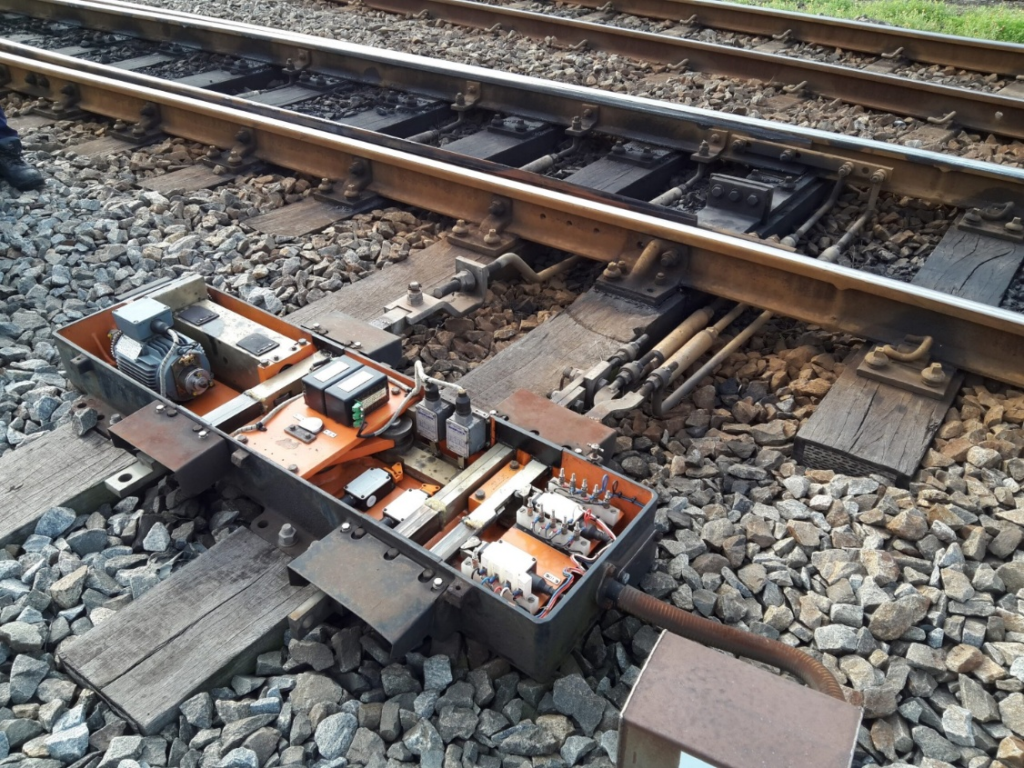
Key railway applications include:
- Side bearers, fitted between the railcar body and the bogie, reduce vibration and improve stability.
- Center liners support load transfer and minimize wear at the pivot point between the bogie and the car body.
- Bushings and thrust washers are used in articulation points where reliability is non-negotiable.
Railway operators appreciate that Vesconite:
- Offers low friction, reducing energy loss and surface wear.
- Is self-lubricating, minimizing the need for costly lubrication runs.
- Can run dry if necessary, ideal for regions with extreme climates where greases might wash out or freeze.
The bottom line? Vesconite helps deliver smoother rides for passengers, lower noise levels, and extended service life for rolling stock, all while cutting down on maintenance costs and service disruptions.
Agriculture
Agriculture presents a different kind of battlefield:
- Dust, mud, and debris are everywhere.
- Equipment runs outdoors year-round, exposed to rain, UV radiation, and chemicals.
- Lubrication points often get ignored due to the sheer size and spread of farm operations.
Traditional materials either wear out fast or require constant maintenance. Vesconite offers a maintenance-free alternative that farmers truly appreciate.
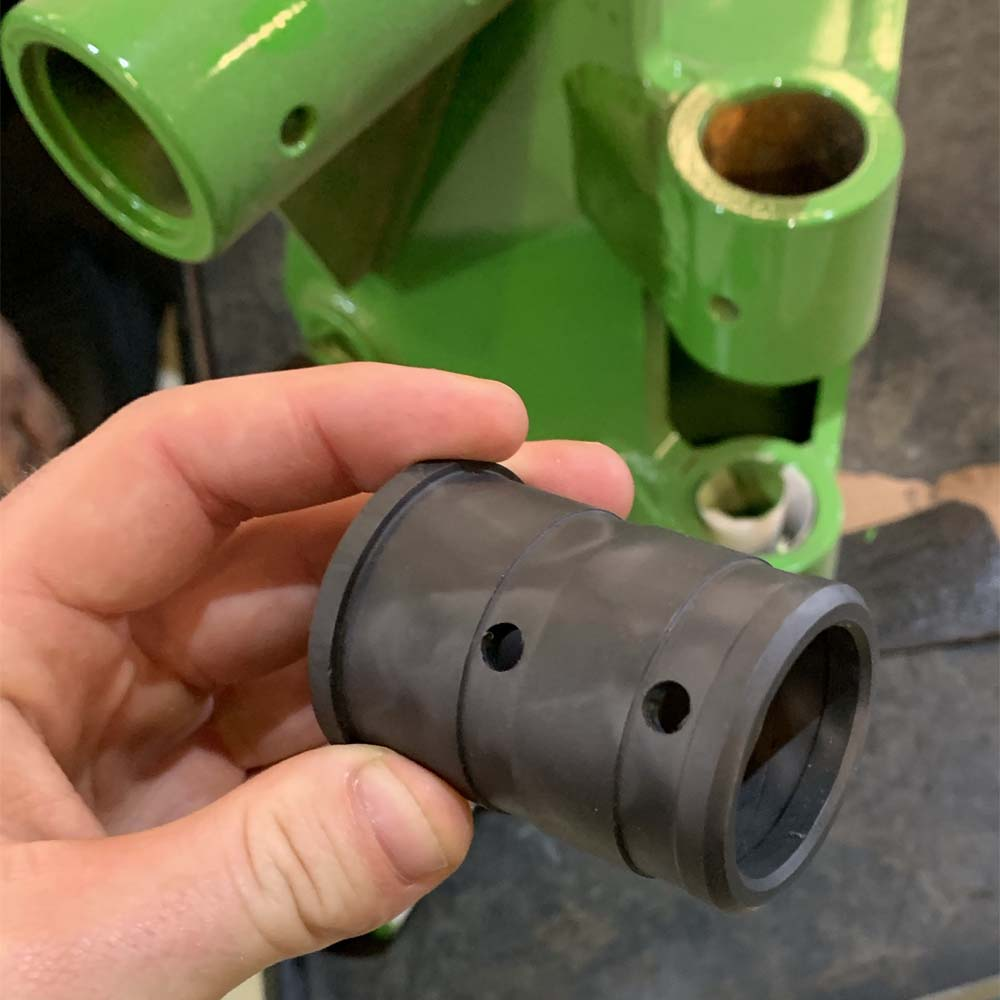
Vesconite Crop Sprayer bushings
Key agricultural applications include:
- Pivot bushings in centre-pivot irrigation systems operate reliably even when splashed continuously with water and fertilizer runoff.
- Bearings and wear plates in harvesters and plows, resisting abrasion from soil, rocks, and crop debris.
- Tractor and implement bushings handle heavy loads without seizing or deforming.
Vesconite’s advantages in agriculture:
- Water and chemical resistance, perfect for exposure to fertilizers, pesticides, and rough field conditions.
- Dirt-shedding properties, less build-up of grime, and less wear compared to metals or lower-grade plastics.
- Lightweight, reducing the strain on moving parts and, in some cases, even boosting fuel efficiency.
For farmers, the ability to skip greasing, reduce downtime, and rely on consistent performance season after season makes Vesconite not just a good choice, but a transformative one.
Summary: Vesconite in Action
| Industry | Application Examples | Why Vesconite Works Best |
| Industrial | Bearings, bushings, wear plates | Water stability, corrosion resistance, and tight tolerance maintenance |
| Marine | Water and chemical resistance, dirt-shedding, lightweight, and maintenance-free | Rudder bearings, propeller shaft bearings, and bushings |
| Railways | Side bearers, center liners, thrust washers | Vibration reduction, low friction, maintenance-free dry running |
| Agriculture | Pivot bushings, harvester bearings, tractor parts | Water and chemical resistance, dirt-shedding, lightweight and maintenance-free |
Vesconite isn’t just another material option; it’s a serious upgrade for industries that need toughness, reliability, and low-maintenance performance. Wherever the conditions are rough and the demands are high, Vesconite has proven it can handle the challenge, often better than the materials it replaces.
Vesconite vs. Other Materials
No material exists in a vacuum. When you’re choosing what to build with, it’s all about trade-offs: weight, cost, performance, durability. So, how does Vesconite stack up against some of the more familiar names like bronze, nylon, and PTFE (Teflon)?
Let’s break it down.
Vesconite vs. Bronze
Bronze has been a trusted material for bearings and bushings for decades, and for good reason. It’s strong, durable, and widely available. But it’s not without its downsides:
- Corrosion: Bronze can corrode over time, especially in marine or humid environments.
- Lubrication: It requires regular greasing or oiling to perform well.
- Weight: Bronze is heavy, which can be a disadvantage in applications where weight matters.
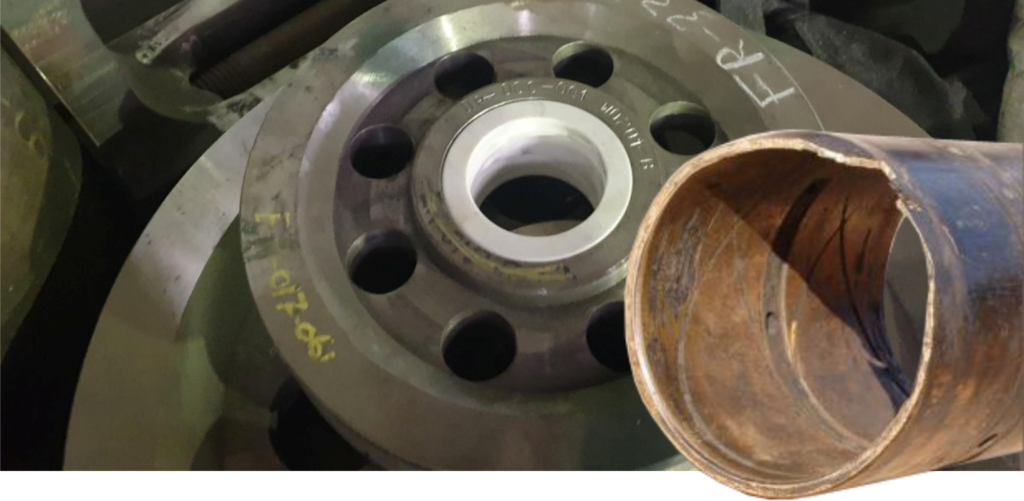
Vesconite, by comparison:
- Won’t corrode, even in saltwater.
- It is self-lubricating, with less maintenance and fewer breakdowns.
- It is much lighter, has easier handling, and less wear on surrounding parts.
If you're in a corrosive or water-rich environment, Vesconite is a clear winner over bronze. However, for extremely high-temperature applications (above 100°C/212°F), metals like bronze might still edge it out.
Vesconite vs. Nylon
Nylon is a popular choice for industrial parts because it’s cheap and easy to work with. But it comes with a big catch: water absorption. Nylon can swell up to 3% in volume when exposed to moisture. That doesn’t sound like much until you’re trying to run precision bearings.
In contrast:
- Vesconite absorbs virtually no water, perfect for wet, humid, or submerged conditions.
- It offers better dimensional stability.
- It has higher load-bearing capabilities compared to nylon.
If your application involves any kind of moisture, Vesconite is a safer, longer-lasting bet. Nylon might still be a good fit for dry, lightweight applications where cost is a bigger concern.
Vesconite vs. PTFE (Teflon)
PTFE is famous for its incredibly low-friction properties. Think non-stick pans; that slipperiness is hard to beat. But PTFE is also quite soft, which means it doesn’t perform well under heavy loads or in high-wear situations.
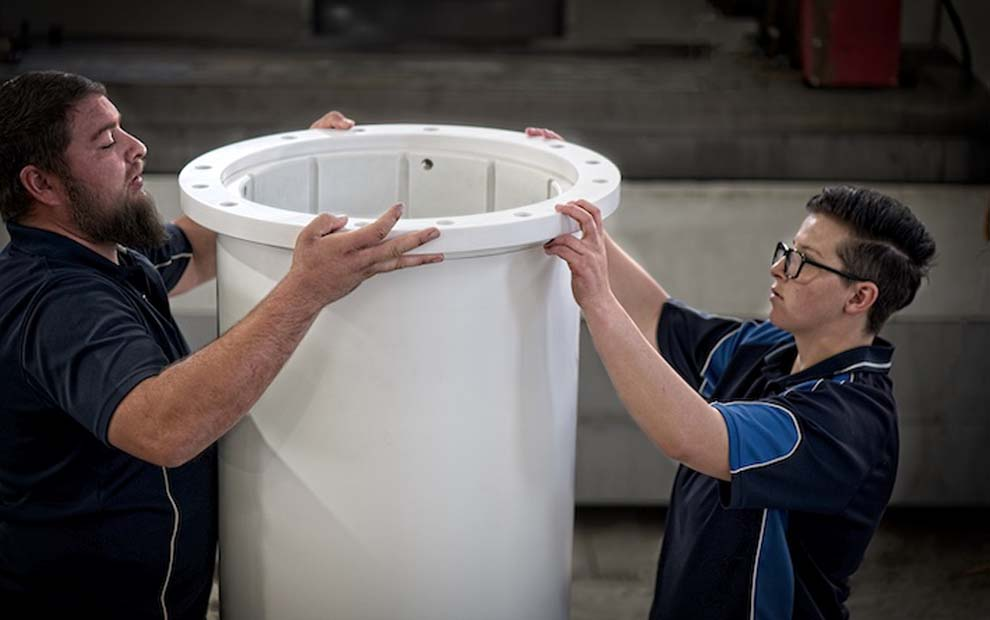
Vesconite offers:
- Low friction, while not as slippery as PTFE, it’s plenty low for industrial uses.
- Much higher load capacity.
- Better wear resistance over time.
- Easier machining PTFE can deform easily during machining, while Vesconite holds its shape.
For low-load, low-friction applications, PTFE might still be the go-to. But for anything heavy-duty, Vesconite gives you the best of both worlds: low friction and durability.
Quick Comparison
| Property | Bronze | Nylon | PTFE (Teflon) | Vesconite |
| Corrosion Resistance | Poor | Moderate | Excellent | Excellent |
| Water Absorption | None | High | None | None |
| Load-Bearing Capacity | High | Medium | Low | High |
| Friction Coefficient | Moderate | Moderate | Very Low | Low |
| Weight | Heavy | Light | Light | Light |
| Maintenance Needs | High | Moderate | Low | Very Low |
| Temperature Resistance | High | Moderate | High | Moderate to High |
| Machinability | Good | Good | Difficult | Good |
| Cost (Relative) | High | Low | High | Moderate |
While Vesconite wins in a lot of categories, it’s important to be realistic. It may not be the cheapest option upfront compared to nylon, and in extremely high-temperature environments (think beyond 100–120°C), metals might still have the upper hand.
But for most heavy-duty, water-exposed, or maintenance-sensitive applications, Vesconite isn’t just a good alternative; it’s often the smarter long-term choice.
Common Misconceptions About Vesconite
Like any material that challenges the status quo, Vesconite has picked up a few myths and misconceptions along the way. And honestly, it’s understandable when you first hear about plastic replacing metal in high-load, high-wear applications; it does sound a little too good to be true.
Let’s clear up some of the most common misunderstandings.
“It’s just another plastic.”
This is probably the first thing skeptics think. After all, there are dozens of engineering plastics out there, nylon, acetal, PTFE, and UHMWPE, so what makes Vesconite any different?
Well, it’s not just another plastic. Vesconite is a thermopolymer specifically engineered to deliver:
- High load-bearing capacity comparable to metals
- Self-lubricating properties without greases or oils
- Dimensional stability, even when submerged in water
- Long wear life under extreme conditions
Calling it “just another plastic” is like calling carbon fiber “just another fabric.” It’s in a completely different league.
“It’s expensive.”
At first glance, Vesconite may seem pricier than materials like nylon or standard plastics. But here’s the thing, upfront cost isn’t the whole story.
When you factor in:
- Reduced maintenance
- Longer replacement cycles
- Lower downtime costs
- No need for regular lubrication
The lifecycle cost of Vesconite is often significantly lower than cheaper alternatives. Companies that switch to Vesconite typically see a fast return on investment because they aren’t constantly stopping to replace worn-out parts or deal with breakdowns.
In heavy-use industries, the real expense isn’t the material. It’s the maintenance and downtime. Vesconite minimizes both.
“You can’t machine it easily.”
Another myth is that Vesconite must be hard to work with, especially compared to metals. The reality? Vesconite machines beautifully.
You don’t need any special tools or equipment. Standard lathes, mills, and cutting tools, the same ones you’d use for bronze or brass, work perfectly with Vesconite. Plus, because it’s lighter, it’s often easier to handle and machine.
Basic machining tips for Vesconite:
- Keep tool speeds moderate
- Use sharp, carbide-tipped tools for best results
- Avoid overheating by using proper cooling or slower speeds
If you can machine bronze, you can machine Vesconite, and you’ll probably find it easier and faster.
By cutting through these misconceptions, it’s easy to see why Vesconite isn’t just some niche material. It’s a proven, reliable solution for industries that can’t afford material failures.
Conclusion
Vesconite isn't just another option in material selection—it's a significant upgrade for industrial applications that demand excellence. By dispelling common misconceptions, we see Vesconite's remarkable advantages in lifecycle cost, maintenance requirements, and operational reliability. Compared to bronze, it offers superior corrosion resistance and self-lubrication; against nylon, it maintains dimensional stability with zero water absorption; versus PTFE, it provides higher load capacity and wear resistance. For industries operating in demanding conditions that cannot afford equipment failures, Vesconite offers a proven, dependable solution. Contact us to discover how Vesconite can revolutionize your equipment performance, reduce maintenance costs, and significantly extend the service life of critical components.

